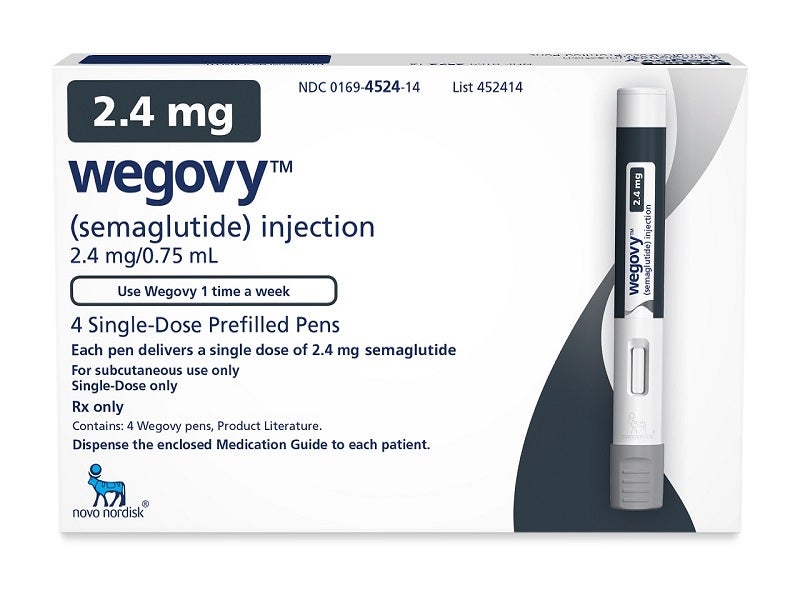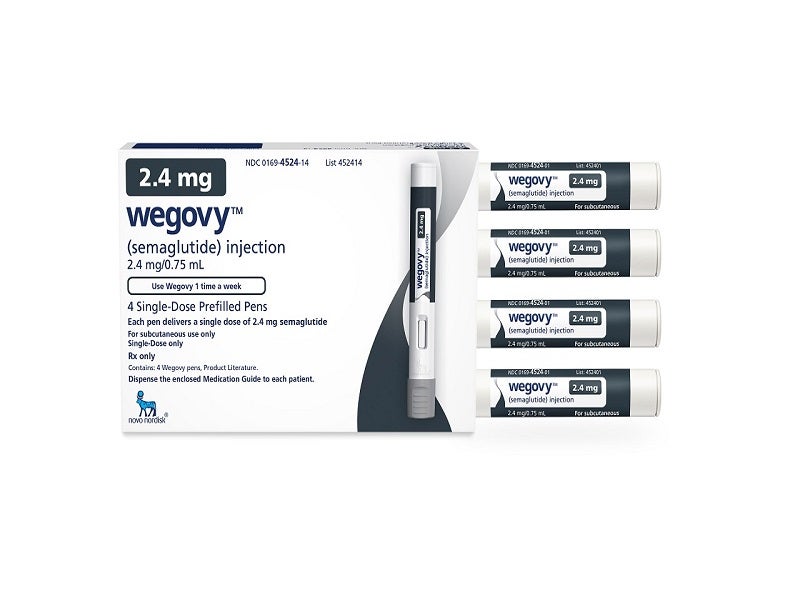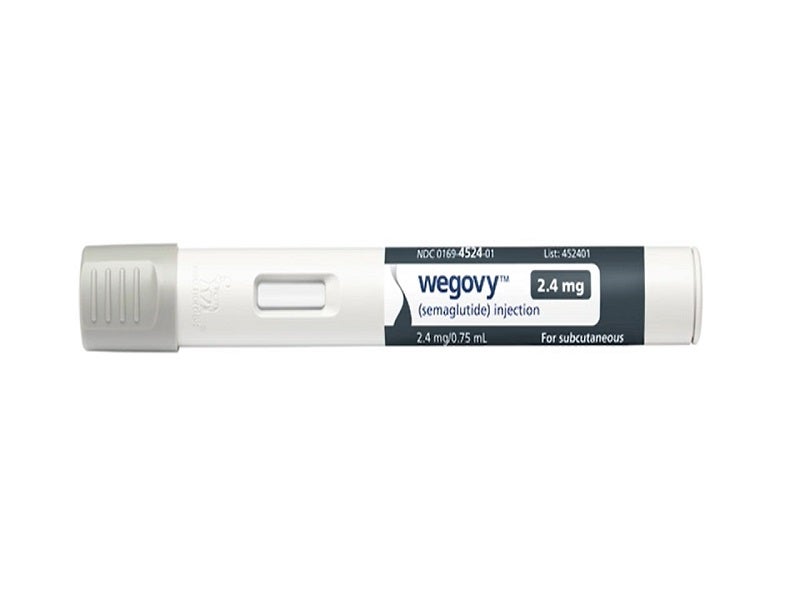Wegovy® (semaglutide) is a glucagon-like peptide-1 (GLP-1) receptor agonist indicated as an adjunct to a reduced diet and increased exercise for chronic weight management in overweight or generally obese adults with at least one weight-related condition such as high blood pressure, Type 2 diabetes (T2D) or high cholesterol.
It is also the first weight loss medication to prevent life-threatening cardiovascular events such as heart attacks and strokes, in adults with cardiovascular disease who are also obese or overweight.
Developed by Novo Nordisk, a pharmaceutical company based in Denmark, semaglutide was initially approved by the US Food and Drug Administration (FDA) for the treatment of T2D at lower doses (0.5mg and 1mg) and was subsequently launched under the brand name Ozempic® in December 2017.
Wegovy is available as a sterile, aqueous, clear, colourless solution in five prefilled, disposable, single-dose pens of 0.25mg, 0.5mg, 1mg, 1.7mg or 2.4mg dosage strengths for subcutaneous infusion.
Regulatory approvals for Wegovy
Novo Nordisk submitted a new drug application to the FDA and a marketing authorisation application to the European Medicines Agency for semaglutide to treat chronic weight management in December 2020.
The FDA approved semaglutide under the brand name Wegovy for chronic weight management in adults in June 2021. The drug was granted marketing authorisation across the EU in January 2022.
In December 2022, the FDA expanded the label of Wegovy injection 2.4mg, making it the first antiobesity medicine available for teens aged 12 years and older with once-weekly dosing.
In March 2024, the FDA approved the Wegovy to lower the risk of cardiovascular death, heart attack, and stroke in adults with cardiovascular disease who are either obese or overweight.
Obesity causes and symptoms
Obesity is a serious chronic illness that necessitates long-term treatment.
It is linked to several other severe health issues that may shorten life expectancy, including T2D, cardiovascular disease, obstructive sleep apnoea, non-alcoholic fatty liver disease and certain types of cancers.
Obesity is usually caused by a combination of genetic factors, the environment, and personal dietary and physical activity choices.
An estimated 650 million individuals are currently living with obesity worldwide.
Semaglutide’s mechanism of action
Semaglutide is a long-acting GLP-1 receptor agonist with 94% sequence homology to naturally occurring human GLP-1 hormone.
It binds to and mimics the activity of the human GLP-1 receptor, which is present in various regions of the brain involved in regulating appetite. GLP-1 is a physiological regulator of appetite and caloric intake.
Semaglutide regulates food intake and promotes weight reduction by suppressing appetite and boosting the feeling of fullness, making people eat less and thus consume fewer calories.
Clinical trials on Wegovy
The FDA’s approval of Wegovy was based on the results of the Semaglutide Treatment Effect in People with Obesity clinical trial programme.
Wegovy’s safety and efficacy were studied in four 68-week, randomised, double-blind, clinical trials with around 4,500 participants, who were either obese or overweight.
Three of the four studies (Studies I, II and III) were placebo-controlled trials while the other study was a placebo-withdrawal trial.
Patients recruited in the placebo-controlled studies were randomised to receive the escalated 2.4mg subcutaneous dose of either Wegovy or placebo once a week during a 16-week period, followed by the administration of a maintenance dose for the next 52 weeks.
In the placebo-withdrawal study, Wegovy was escalated during a run-in period of 20 weeks. Patients who reached the 2.4mg dose after the run-in period were randomised to receive either continued Wegovy therapy or placebo for 48 weeks.
In Studies I, II and III, 83.5%, 67.4% and 84.8% of Wegovy-treated patients respectively experienced losing 5% or more of their body weight, compared to 31.1%, 30.2% and 47.8% of placebo-treated patients at 68 weeks.
In the placebo-withdrawal study, a 7.9% drop in body weight was observed in patients treated with Wegovy compared with a 6.9% reduction in the placebo group from randomisation at weeks 20 to 68.
Wegovy showed a safe and well-tolerated profile throughout the programme, with the most prevalent adverse events being gastrointestinal.
The most frequent side effects reported in patients treated with Wegovy during the clinical trials were nausea, diarrhoea, vomiting, constipation, stomach discomfort, headache, tiredness, dyspepsia, dizziness, abdominal distension, eructation, hypoglycaemia in T2D, flatulence, gastroenteritis, and gastroesophageal reflux disease.
Additional trials on Wegovy
The SELECT cardiovascular trial, a randomised, double-blind, placebo-controlled study, evaluated the effectiveness of semaglutide 2.4mg versus placebo in reducing major adverse cardiovascular events (MACE) in adults with cardiovascular disease, obesity, or overweight but no prior diabetes.
Conducted across 41 countries with 17,604 recruited patients, the trial demonstrated a 20% reduction in MACE for those treated with semaglutide compared to placebo.
All components of MACE – cardiovascular death, nonfatal heart attack, and nonfatal stroke – showed improvement. Semaglutide 2.4mg was also found to be safe and well-tolerated, consistent with previous studies.






